DENVER — From Internal Revenue Service (IRS) audits to Union election spending to tax increases (with or without voter approval), 2017 was a crazy ride. Complete Colorado takes a look (in no particular order) at some of the biggest stories to hit the state last year.
TAX INCREASE or BUDGET REFORM?
Two bills in the legislature last year dealing with tax increases drew the support (and ire) of Republicans from all corners of the state. Senate Bill 17-267, a.k.a. the Sustainability of Rural Colorado Act, and House Bill 17-1242, a.k.a. New Transportation Infrastructure Funding Revenue, proved to be the biggest party busters of the year.
The backlash from SB-267 extended all the way to the final days of 2017 and HB-1242 sparked a response from a Colorado think tank that is expected to come to the voters in 2018.
HB-1242, which would have asked voters to approve a 21 percent sales tax increase to repay similar transportation bonds, eventually died in the Senate Finance Committee. There were several other attempts at transportation bills in both the Senate and the House, but all died.
SB-267, however, grew new legs frequently during the session, and after several rewrites, including a 72-page strike below, it cleared both chambers in the final hours of the session.
Supporters, who called the bill the grand compromise, said it would do a lot to help rural Colorado, including:
- Reverse the funding reduction to hospitals.
- Move the Hospital Provider Fee (HPF) to an enterprise fund.
- Put $2 billion into Certificates of Participation (COPs) for capital construction and transportation.
- Create a business personal property tax credit for small business.
- Provide extra money for rural schools.
- Require all state agencies to submit a plan for a 2 percent budget reduction.
- Protect senior homestead exemption.
Opponents, who took the biggest issue with the HPF part, said it was worse than Ref C and Ref D and without a public vote, was the largest “grand betrayal” from Republicans in the past 25 years of Colorado politics. They also argued it was too complicated, it violated the single-subject rule and its use of Certificates of Participation for capital expenditures, rather than asking the taxpayer to incur new debt.
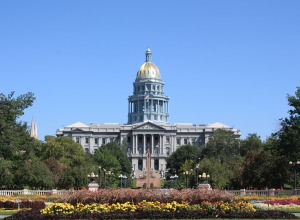
The HPF is a fee is assessed on all hospitals, which pays a varied amount for every night someone sleeps in a hospital bed. The fee is collected through a charge added to patients’ hospital bills, though the law creating the fee bars hospitals from showing it on the bill as a line item, leading some to call it a bed tax. The revenue is then used to reimburse hospitals to sustain and expand Medicaid programs and for the Colorado Indigent Care Program.
For the two years prior, Democrats tried to convert the fee from its segregated cash fund to an enterprise fund. Because it generates about $700 million a year in revenue, it causes the state to hit its revenue cap under the Taxpayer’s Bill of Rights (TABOR). For the past couple of years, taxpayers received refunds because of the excess.
Supporters said the shift was needed to stop funding other state programs on the backs of the hospitals. In its own fund, the fee will go strictly to hospitals, but it will also free up TABOR cap space, increasing the spending capability by about $500 million.
THE GREAT DIVIDE
Senate Bill 267 divided Republicans more than anything in recent memory.
The Colorado Union of Taxpayers (CUT) for the first time created a “Wall of Shame” for its annual award ceremony specifically to shame those they believe damaged the taxpayer.
Wall of Shame inductees included Senators Randy Baumgardner (R- Cowdrey), Kevin Grantham, (R-Canon City) and Kevin Priola (R-Henderson); and Representatives Phillip Covarrubias (R-Arapahoe), Lois Landgraf (R-El Paso), Polly Lawrence (R-Douglas), Kimmi Lewis (R-Las Animas), Larry Liston (R-El Paso) and Clarice Navarro (R-Pueblo).
Non-CUT signers who were also included in the Wall of Shame were Senators Lucia Guzman (D-Denver), and Jerry Sonnenberg (R-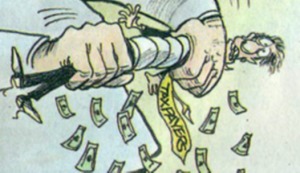 Sterling) and Representatives Jon Becker (R-Fort Morgan) and KC Becker (D-Boulder).
Sterling) and Representatives Jon Becker (R-Fort Morgan) and KC Becker (D-Boulder).
Sonnenberg, who represents a big chunk of northeast Colorado, was the bill’s sponsor.
According to the news release, the Wall of Shame was a direct result of SB 17-267. CUT said in its release that “267 was the most egregious bill in decades pushed through in the waning hours of the 2017 session.”
CALIFORNIAN OF THE YEAR
SB-267 was one reason Independence Institute* President Jon Caldara announced his inaugural “Californian of the Year” award.
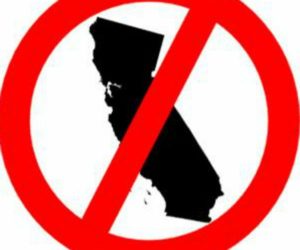 Caldara said: “Unlike California, Colorado holds a deep belief in asking voters directly BEFORE raising debt or taxes. We even enshrined it in our state constitution. By calling a massive hospital bed tax a “fee” and labeling debt as “Certificates of Participation,” Sonnenberg’s bill raised taxes by $550 million per year and put Colorado families in debt by nearly $2 billion, all while avoiding a vote of the people. Colorado character is best described as craving the freedom to make our own decisions. By contrast, Californian character, which is taking hold of our once ruggedly individualistic, freedom-loving state, is best described as making decisions for other people.”
Caldara said: “Unlike California, Colorado holds a deep belief in asking voters directly BEFORE raising debt or taxes. We even enshrined it in our state constitution. By calling a massive hospital bed tax a “fee” and labeling debt as “Certificates of Participation,” Sonnenberg’s bill raised taxes by $550 million per year and put Colorado families in debt by nearly $2 billion, all while avoiding a vote of the people. Colorado character is best described as craving the freedom to make our own decisions. By contrast, Californian character, which is taking hold of our once ruggedly individualistic, freedom-loving state, is best described as making decisions for other people.”
Caldara nominated five Colorado residents, who he believed best fit the mold as trying to make Colorado more like California. Nominees, which were announced the week before Christmas were:
- Christine Berg, mayor of Lafayette, for her leadership and vote to make Lafayette the first city in Colorado to bar local restaurants from advertising “sugar drinks” on kids’ menus.
- Jared Polis, gubernatorial hopeful, multi-millionaire and U.S. Congressman for his goal to out-Cali Cali with his “goal” of 100% renewable energy by 2040 at a cost of only $44 billion.
- Brandon Rietheimer, citizen activist, Bernie sycophant and manager of a Red Robin restaurant, for his work in forcing Denver building owners to plant lawns on their roofs.
- Jerry Sonnenberg, state senator, conservative when in his rural home district and liberal when under the gold dome for destroying TABOR by raising taxes and debt to all Coloradans without asking voters first.
- Aidan Cook, animal-rights activist and snazzy millennial-beard aficionado, for his efforts to end the time-honored and children-loved activity of “mutton-busting” at the Western Stock Show.
In the end, it was Sonnenberg who won the award. It was announced Dec. 27.
FIX OUR DAMN ROADS
Caldara also took issue with HB-1242 and the idea that some lawmakers want to raise taxes to pay for road work, so he launched the campaign to “Fix Our Damn Roads.”
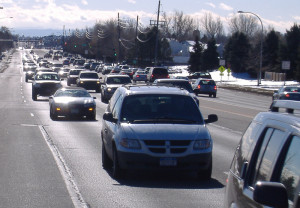
The idea is to ask voters in November 2018 to tell legislators there is enough money already in the budget to fix the road we have now as well as fund new ones.
The initiative would task state lawmakers with reallocating priorities within the existing budget to pay back revenue anticipation notes to fund the construction over a 20-year term. The money would fund the Colorado Department of Transportation’s most critical needs.
SPECIAL SESSION
SB-267 continued to cause havoc long after it passed. In July, Complete Colorado broke the news that the bill had a drafting error 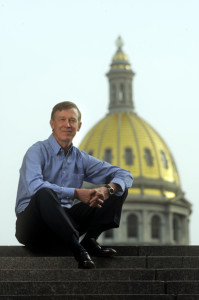 that left RTD and other special taxing districts out of the new taxing equation for marijuana taxes.
that left RTD and other special taxing districts out of the new taxing equation for marijuana taxes.
Complete Colorado obtained an email from RTD attorney Rolf Asphaug to RTD board members where he said RTD and the Scientific and Cultural Facilities District (SCFD), were notified on June 29 that due to a drafting error in SB 267 they would be unable to collect the 2.9 percent sales tax on retail marijuana sales, effective July 1.
Gov. John Hickenlooper called a special session in October to fix the problem, but Republicans were unwilling to put the tax back in, saying it would violate TABOR by increasing taxes without asking voters.
WELD COUNTY STRUGGLES
If 2017 was good for anyone, it wasn’t Weld County or its Board of Weld County Commissioners who received one piece of bad news after another.
The county that for years has boasted high revenues, no debt, no taxes and a low mill levy, was in the news from start to finish in 2017, and most of it negative.
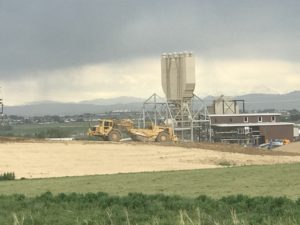
A two-year fight with residents of Johnstown for all intents and purposes came to an end with the Colorado Court of Appeals overturning a land use decision that allowed concrete giant Martin Marietta to put a $20 million asphalt plant near their homes. The county has asked for a rehearing, but the odds are not in their favor.
Early in the year, the IRS notified the county they were being audited for possibly allowing improper commuter mileage reimbursement. Later during the year, that possibility was confirmed and the county was hit with fines for the commuter mileage given to one commissioner as well as other items the IRS found during the audit.
An external performance audit on the commissioners ordered by a unique governing board known as the Weld County Council came back with a handful of recommendations. However, four of the five commissioners chose to ask voters to disband the council after the audit was ordered. Other local elected officials opposed the commissioners, and two groups of citizen committees formed to both support and oppose the idea. In the end, voters rejected the idea and kept the oversight group intact.
Finally, commissioner chairwoman Julie Cozad remains under investigation by the Independent Ethics Commission for allegedly

accepting an improper gift from Nobel Energy. The complaint was filed in July, and the commission agreed to hear it in the fall. However, Cozad argues it does not have jurisdiction over Weld County because it is a home rule county. They are scheduled to meet after the first year to determine if they will continue with jurisdiction. Cozad is being challenged for her seat in 2018 by fellow Republican and Johnstown Mayor Scott James, whose own community is debt free and recently opened Colorado’s only Scheels sporting goods as well as paid for a new community center with cash.
DOUGLAS COUNTY SCHOOL BOARD RACE
Similar to the 2015 Jefferson County election, voters in Douglas County had the opportunity to change the philosophical makeup of its school board.
Four seats were up for election, and the current majority needed all four to maintain control. Eight candidates ran for the four seats in two “slates.”
The two campaigns delivered a highly contentious fight, but in the end voters flipped their majority school board members from a conservative viewpoint to a more liberal, union-backed one.
In one of its first actions, the new board ended the multi-year battle over vouchers.
OTHER NOTEABLES:
- Coloradans for Civil Liberties hosted a successful inaugural FASTER training.
- A clique of Capitol Hill reporters denied Complete Colorado reporter Sherrie Peif credentials based entirely on her affiliation with the Independence Institute.
- The legislature passed a bill that requires government entities to deliver open records in their native format.
- Jefferson County Public Schools hired a new superintendent and made him the highest paid super in the state.
- Grand Junction Sentinel Publisher threatens to sue a state legislator for libel and then compares him to Syrian dictator Bashar al-Assad.
- The legislature passed a bill requiring free speech on college campuses.
- The legislature passed a bill requiring school district to share their mill levy overrides with charter schools in their district.
- Colorado native Neil Gorsuch was named to the U.S. Supreme Court.
*Complete Colorado is a product of the Independence Institute.


